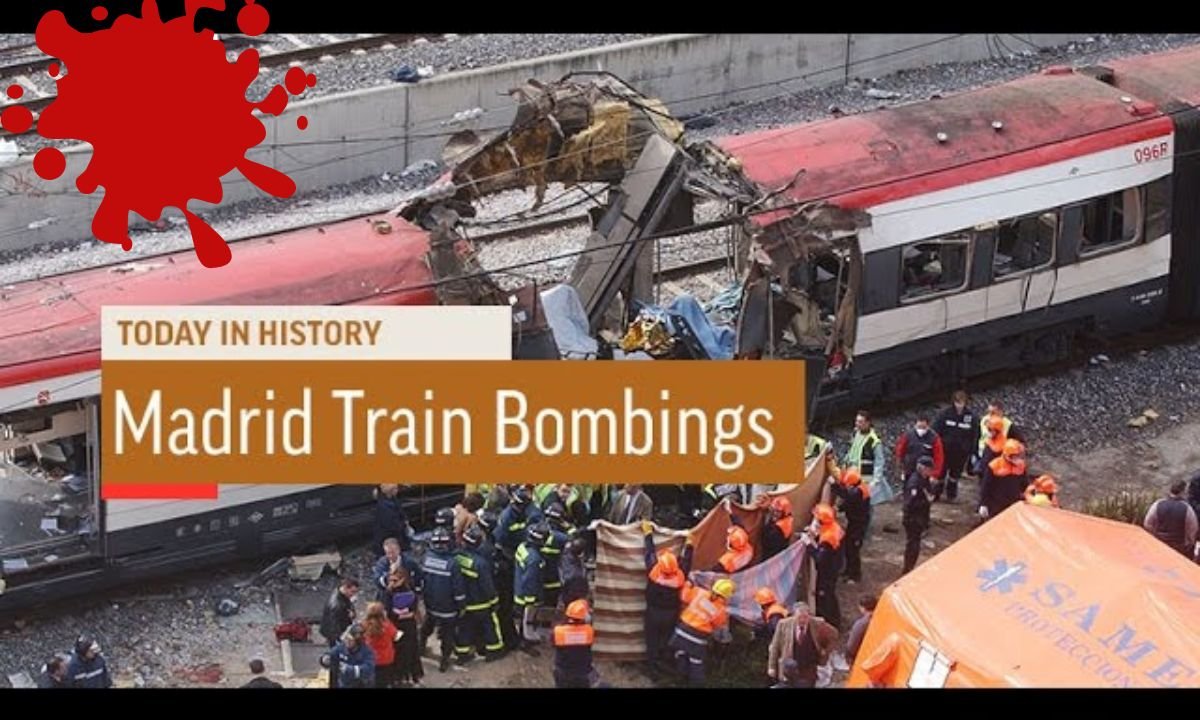Madrid Train Bombings 2004: Tragic event that killed 193 people
Madrid fell into chaos and tragedy after a series of planned terrorist strikes and train bombings targeting passengers on March 11, 2004. The 2004 Madrid Train bombs, often known as 11-M bombs.
11-M bombs had a lasting impact on a country which killed 191 innocent people and wounded nearly 2,000 more. These precisely organized attacks shook the globe and altered Spain’s counterterrorism strategy.
The blasts burst through train carriages, resulting in horrific deaths and severe destruction. The scenes of panic, agony, and uncertainty have been carved into the collective memory of those who witnessed the aftermath.

Madrid Train Bombings 2004
The 2004 Madrid train bombings or 11M, were a series of organized, almost simultaneous bombings against the Cercanías passenger train system in Madrid, Spain. The blasts happened on March 11, 2004 morning, three days before Spain’s general elections.
There were 130 Spanish nationals and 63 citizens from other countries who were victims of the Madrid train bombings in 2004. Victims of other nations belonged to Romania, Bulgaria, Ecuador, Peru, Poland, and others.

The explosions killed 193 people and injured around 2,050. The explosions were the biggest terrorist attack in Spanish history and the bloodiest in Europe since 1988. The attacks were reportedly carried out by persons who opposed Spanish participation in the 2003 US-led invasion of Iraq.
On March 11, 2004, during Madrid rush hour, ten explosions occurred aboard four passenger trains (cercanías). All of the affected trains were moving in the same direction from Alcalá de Henares to Madrid’s Atocha station.
Timeline of bombings
The following timeline of events is based on the judicial investigation.
Atocha Station
Three explosives exploded onboard train 21431 at Atocha Station. The first explosion happened at 07:37, followed by two more four seconds later at 07:38. The affected train carriages were the sixth, fifth, and fourth.
Furthermore, two hours later, a fourth explosive was discovered in the first automobile, ready to explode when rescue workers arrived. The bomb disposal crew safely exploded this explosive under controlled conditions.
El Pozo del Tío Raimundo Station
At El Pozo del Tío Raimundo Station, two bombs exploded in different carriages of train number 21435 at around 07:38 as the train was departing. The affected carriages were the fourth and fifth.
Additionally, a bomb was discovered in the third carriage and was disposed of by the TEDAX team on the platform, causing slight damage to the third carriage.

Santa Eugenia Station
At around 07:38, one explosive exploded at the Santa Eugenia Station (train number 21713). Only the fourth wagon was impacted.
Calle Téllez (train number 17305) is 800 meters from Atocha Station. At around 07:39, four explosives exploded in various train carriages. The impacted carriages were the first, fourth, fifth, and sixth. This train waited for train 21431 to leave platform 2 at Atocha.
Aftermath of Madrid Train Bombings
There was disagreement between Spain’s two main political parties, the PSOE ( Socialista Obrero Español) and the PP (Partido Popular) over the handling and representation of bombing incidents by the PP government.
The PP, under the leadership of Prime Minister José María Aznar, initially blamed the Basque separatist organization ETA (Euskadi Ta Askatasuna-Basque Homeland and Freedom) for bomb attacks.
However, other political parties were convinced that Islamist militant organization Al-Qaeda launched these attacks. Hence, opposition parties accused the PP of removing evidence of Al-Qaeda to prevent public outrage over Spain’s role in the Iraq War.
The attacks happened three days before the general election, and the PP’s handling of the crisis is believed to have contributed to their defeat in the elections.
Following the attacks, nationwide demonstrations and protests were held and the public demanded the government to be transparent regarding the bombings investigation.

Responsibility for the 2004 Madrid train bombings
The Abu Hafs al-Masri Brigades, a group believed to be affiliated with Al-Qaeda, claimed responsibility for the incident in August 2007. They claimed it was retaliation for Spain’s collaboration with the US in the Iraq War.
Meanwhile, the Spanish judiciary investigated the 2004 Madrid train bombings incident. In September 2007, Spanish judicial findings identified 21 people involved in the 2004 Madrid train bombings but found no link to an external mastermind or al-Qaeda despite huge claims.

In October 2007, twenty-one individuals were convicted, while seven others were acquitted on charges linked to the attacks. Spanish authorities found 18 Islamic extremists and 3 Spanish nationals guilty of the 2004 Madrid train bombings.
A Moroccan national Jamal Zougam was found guilty of his role in the attacks, but investigations revealed no clear links to al-Qaeda. Judge Javier Gomez Bermudez sentenced him to more than 40,000 years in prison for 191 charges of murder. However, under Spanish law, a guilty person can only serve a maximum of 40 years.

The other prominent convicted individuals were José Emilio Suárez Trashorras, Hamid Ahmidan, and Rachid Aglif. José received a 25,000–35,000-year jail sentence and Hamid received 23–25 years imprisonment. However, Rachid was sentenced to 15–18 years jail term.
Court proceedings show that Islamist extremists coordinated by Al-Qaeda were responsible for the attacks. However, it is uncertain whether the claim of train blasts by the Abu Hafs al-Masri is legitimate.

Controversies
In Spain, the question of who was responsible for the attacks is still being debated. The Partido Popular Party (PP) and some media sources (most notably El Mundo and the Libertad Digital radio station) say the Spanish judicial investigation regarding train bombings has inconsistencies and contradictions.
Spanish and international investigations continue to argue the unreliability of ETA’s active involvement. Hence, the focus has changed from direct charges against the Basque separatist organization to less precise allegations and general suspicion of Al-Qaeda.
Furthermore, some claim that the bombings were carried out by ETA, as well as members of the security forces and national and foreign (Moroccan) secret services.

Conclusion
Following the 2004 Madrid train bombings, Spain faced serious issues about accountability and justice. The tragic events not only cost the lives of innocent people. But also sparked a heated political discussion about how the attacks were handled and represented.
Despite ongoing investigations and shifting narratives, the country seeks closure and clarity about the genuine culprits of this tragic event. As Spain looks at the aftermath of the 11-M bombings, the search for truth and healing remains a top priority for the country and its people.
Share this content:




Post Comment